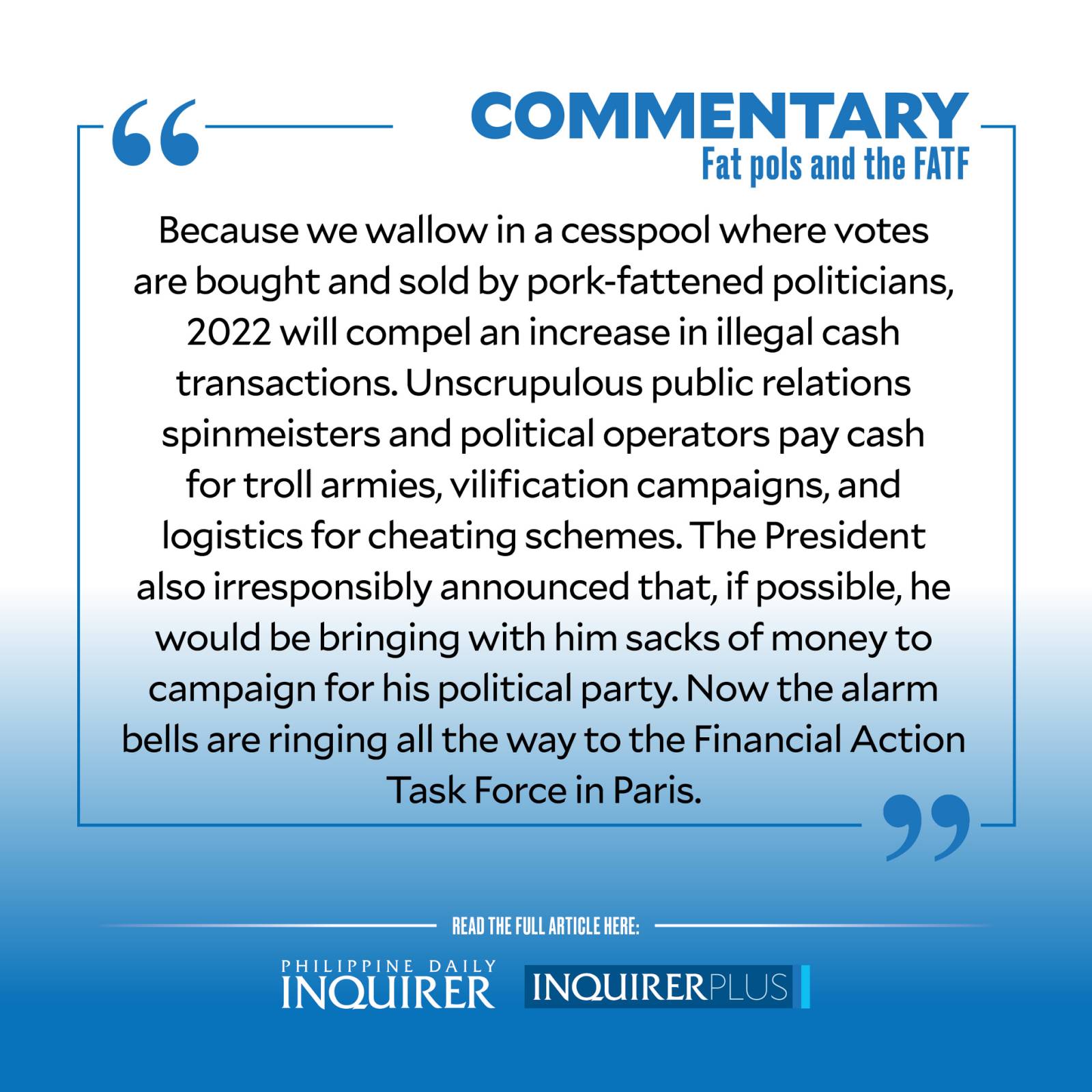
For families dependent on foreign remittances to augment the increasingly meager incomes inflicted on those trapped in the domestic economy, the relevance of the Financial Action Task Force (FATF) cannot be overemphasized. In many cases, the very survival of such families is at stake as economic blight worsens and the hunger and unemployment indices breach historic heights while the prospect of change offered by the 2022 elections wanes.
Tracking our monetary controls against the misuse of cash and the internet for terrorism and money-laundering, the international watchdog FATF included the Philippines in its “grey” and “dark grey” lists for four years. We shed the infamy in 2005 but were back in the list in 2010 and 2012. This year, the Duterte administration has shoved us back in.
The risk posed under this government is understandable. We have been recklessly self-describing ourselves as drug-infested, out of partisan expediency to justify presidential sound bites and impose state terror. That industry is replete with clandestine transactions, illegal cash payments, money laundering, and invisible transfers engineered in the dark web.
Cavalierly tagging critics as terrorists, including activists, altruists, donors to a neighborhood community market, and entertainment celebrities, conjures the false prevalence of widespread terrorism, thus attracting the gaze of international watchdogs wary of terrorism’s funding flows. Red-tagging universities and religious institutions raises the same imaginary specter.
For an administration whose 2016 victory we now know was partly attributable to social media operators and troll armies, such manipulation in cyberspace simply adds to the FATF’s discomfiture.
Another red flag is our hosting of international gambling operations. Note their role in money-laundering. We were principals in the cybertheft of a foreign nation’s central bank, their stolen funds ending up in a small branch of a local bank in a quiet residential neighborhood and from there spirited away to our casino system, where dirty money effectively disappears.
Albeit not quite as obvious, a third red flag is the deliberate dereliction by elected officials complicit in allowing financial aberrations. Note Section 16 of Republic Act No. 9160 that exempts candidates from the anti-money laundering laws.
Note also the misplaced priorities involving massive cash dispersals. Officials, especially those who hide behind our anachronistic bank secrecy laws, are given incredible latitude in the cash aid program—more so on the eve of an election year. Amid the challenges presented by an apocalyptic pandemic, lawmakers prioritized an anti-terrorism bill and an unfunded budget to augment draconian measures that compelled large releases of social amelioration funds, which then went unused, missing, or unaccounted for by the millions.
Thinking there may be no costs to cross-border banking as a result of the FATF warning, irresponsible officials have failed to prove the potency of laws to address the racketeering that hides the criminal provenance of illegal funds.
And yet the FATF has the power to firmly tighten the spigot of international remittances through the global banking networks, the flow of which we desperately depend on given the gross mismanagement of our COVID-19 response. That mismanagement has led to even fewer jobs, thus tanking subsistence incomes needed by people to survive.
Because we wallow in a cesspool where votes are bought and sold by pork-fattened politicians, 2022 will compel an increase in illegal cash transactions. Unscrupulous public relations spinmeisters and political operators pay cash for troll armies, vilification campaigns, and logistics for cheating schemes. The President also irresponsibly announced that, if possible, he would be bringing with him sacks of money to campaign for his political party.
Now the alarm bells are ringing all the way to the FATF in Paris.
——————
Dean de la Paz is a former investment banker and managing director of a New Jersey-based power company operating in the Philippines. He is the board chair of a renewable energy company and is a retired business policy, finance, and mathematics professor. He started writing a business column under the tutelage of Raul Locsin.